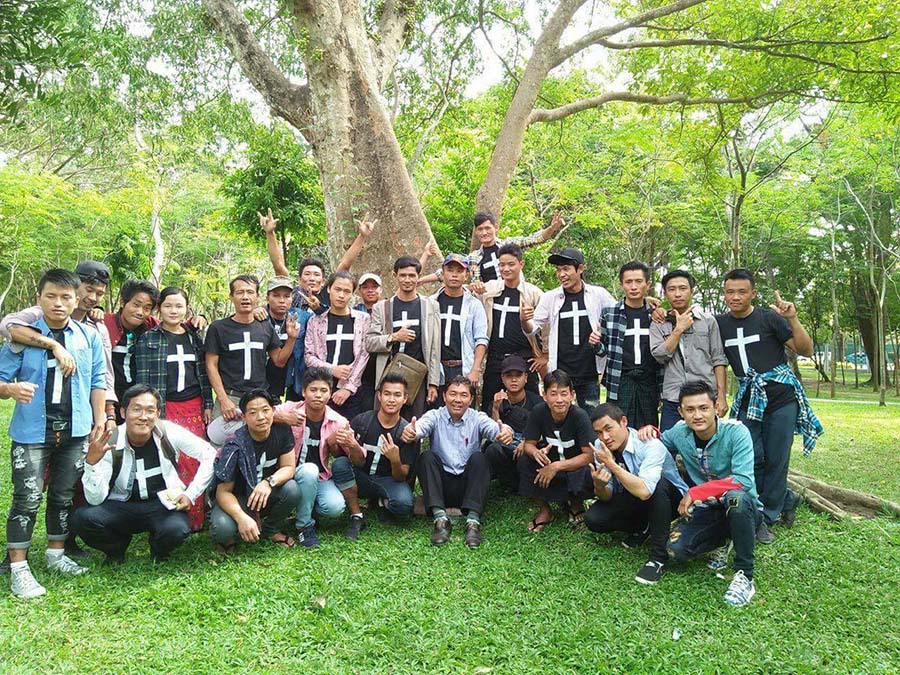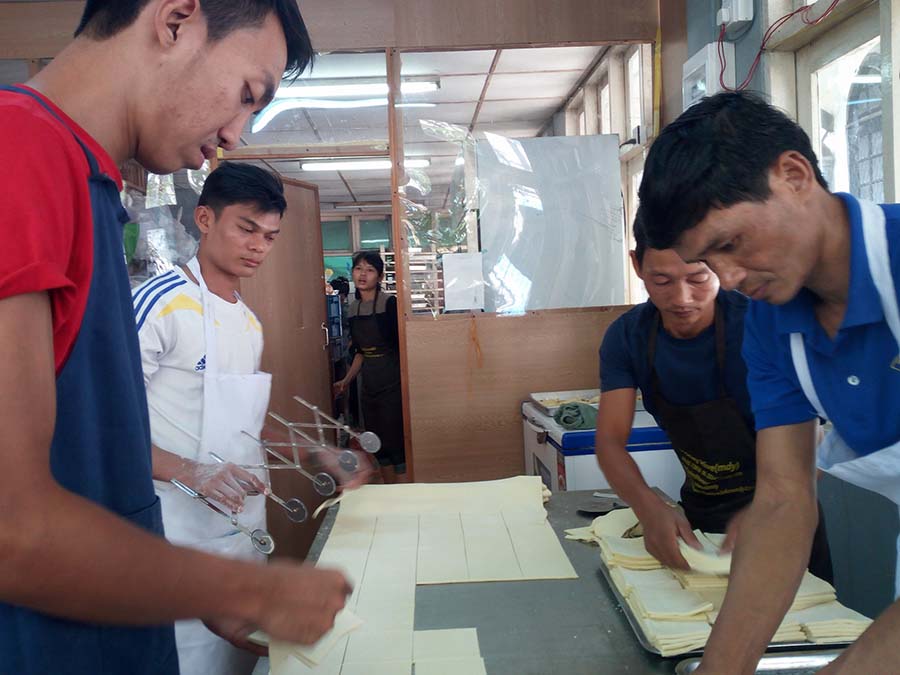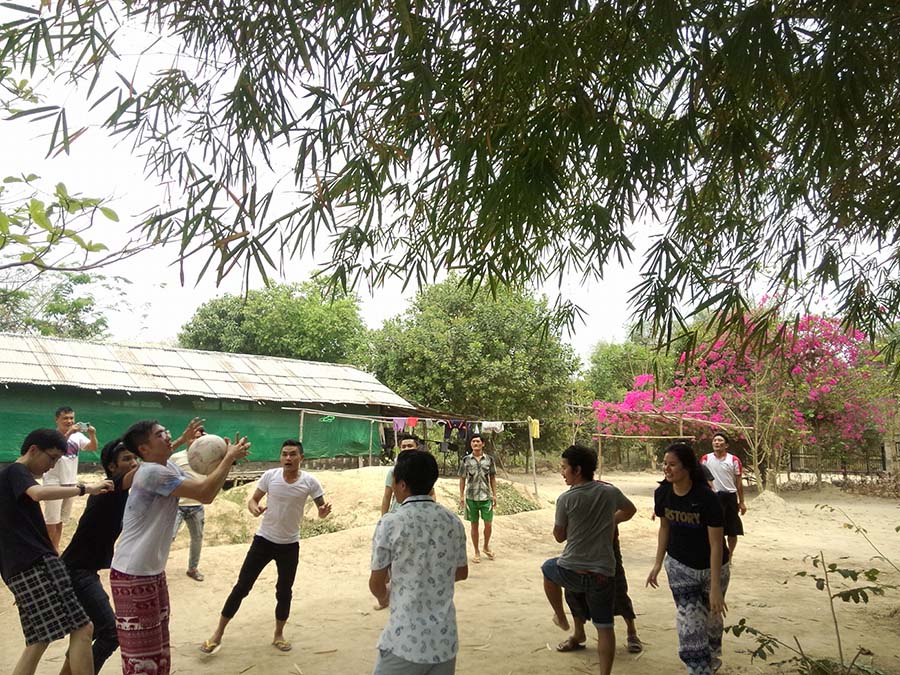It was 2003 when Reverend Zau Tawng realized that most of his students from bible studies in Hpakant were using drugs. It saddened him to realize that the drug problems in his Kachin State homeland were as serious as the jade mining disasters, ongoing conflicts with ethnic armed groups, and internally displaced persons forced to flee their homes.
Clueless but eager to save young addicts, he tried operating a rehabilitation center in his hometown Mohnyin but drugs were easily accessible inside the rehab compound and the center was not a success. Realizing that Kachin State was not the right place for his venture, he moved to Yangon and bought four acres of land in Hlegu where he then founded the Harvest Rehabilitation Center in 2012.
“I empathize with the pressure and anxiety that the parents of addicts have to endure. That’s why I decided to help them,” said Zau Tawng. Since its opening in 2012, the center has housed 242 addicts mostly from Kachin and Shan states, reporting that some 75 percent of them do not relapse after leaving the facility.

Only accepting those who voluntarily enter the rehab process, Harvest Center operates as an abstinence-based residential program that offers sports, music, spiritual studies and therapy, not only to recover from addiction but to promote overall physical and mental well-being.
The Harvest Center welcomes drug addicts of any ethnicity and from any part of the country, as long as they are ready to close that chapter of their lives.
The center generally does not accept newcomers from June to October during its intensive withdrawal period. If addicts are ready to leave the facility, they travel around the country and share their recovery stories in November and December. But life after rehab is uncertain for many, who without jobs and stability face the possibility of relapse.
Zau Tawng was joined by his son Zaw Tu Hkawng, who had experience working in the health sector prior to the center opening. Zaw Tu Hkawng now manages programs for rehabilitated participants. After visiting rehab centers in New Zealand with the Myanmar Young Leaders program in 2017, he learned that employers were often hesitant to hire former drug users – not because they had bad experiences with them but because of a social stigma that painted them as an unreliable workforce. Zaw Tu Hkawng faced the same reaction when reaching out to small hotels and other businesses in the hospitality industry.
“I want to prove to employers that these rehabilitated men deserve a new start and that they can be responsible workers,” he said.
With a strong desire to create job opportunities for his mentees from Harvest, he designed a program to help former drug users get job training called “Nurturing Rehabilitated Users for Employment,” funded by international non-governmental group UnionAID of New Zealand. The program connects business owners who want to help their communities and rehabilitated young men who are seeking vocational training to move forward in their lives.
Of the 24 mentees who are currently living at Harvest, nine of them spent nearly two months at four different businesses receiving onsite training. Three of them worked at a bakery, two worked at a car repair shop, two at a video production business and two at pig farms from January 25 to March 12, 2018, six days a week. With daily reflections and reports from respective employers, the nine Harvest mentees successfully finished their training with support, encouragement and appreciation from employers and coworkers.
Naw San Min Thu, the owner of Orison Frozen Food and one of the employers, wanted her small bakery to be a responsible business. Having reminded her employees to be friendly and kind to the mentees before their arrival, she reminisced about the first day of job training.

“It was more of an excitement to meet these drug-free young men than worrying about them not getting along with my employees,” she said. Although there were some awkward moments at first, her three mentees and coworkers got along well and became friends throughout the program.
Although the employment program ended, Naw San Min Thu offered permanent employment for her mentees to continue their work at Orison after noting their strong will to improve their lives.
“The three mentees were determined to make their lives better and I am very honored to be part of their journeys,” she proudly said.
La Ja Aung, 36, went to Harvest nearly a year ago when he realized that continuing to use drugs would bring embarrassment and burden to his family as well as a possible end to his life. Withdrawal was difficult for him but he was committed.
After being trained and supported by Orison’s familial work environment, La Ja Aung now dreams of owning a small bakery.
“A bakery is doable for a small family. I could also distribute baked goods from Orison as an alternative,” he said. He hopes to earn a stable income and create a stable life for his family.

After managing a successful employment program, the father-son duo has bigger dreams and better plans to serve unprivileged youth in the country. So far running on donations and grants, Reverend Zau Tawng wants to make Harvest Rehab Center a sustainable institution that offers diplomas and degrees to its students in the future, and Zaw Tu Hkawng is ready to strategically implement his father’s dream.
Despite big plans for the future, accommodations at the Harvest center are in need of an upgrade before the monsoon rains come. Reverend Zau Tawng is hopeful despite having a limited budget.
“We don’t have enough to upgrade the entire building now but I believe we’ll figure something out before the rainy season,” said the reverend.

















